Tensions Erupt in Amsterdam
The vibrant city of Amsterdam, known for its canals and rich cultural heritage, witnessed a bitter night of violence and turmoil on Wednesday. Israeli football hooligans, allegedly fervent supporters of the Israeli club Maccabi Tel Aviv, stormed through the city, leaving a trail of chaos and controversy in their wake. The group targeted symbols of Palestinian pride by tearing down Palestinian flags from local homes and businesses as they made their way through the streets. The antagonistic chants of 'death to Arabs' only further inflamed a volatile situation, casting a dark shadow ahead of their team's Champions League match against Ajax.
Provocation and Retaliation
This incident has been condemned across various platforms, with many voicing discontent over the authorities' seeming inability to curb these disruptive events. The chants and actions of the hooligans did not just provoke anger and desperation among local residents and football fans but also spilled over into physical skirmishes. The perfect storm of conflicting ideologies, national identities, and football loyalty converged on the cobbled streets of Amsterdam, setting the stage for violent confrontations.
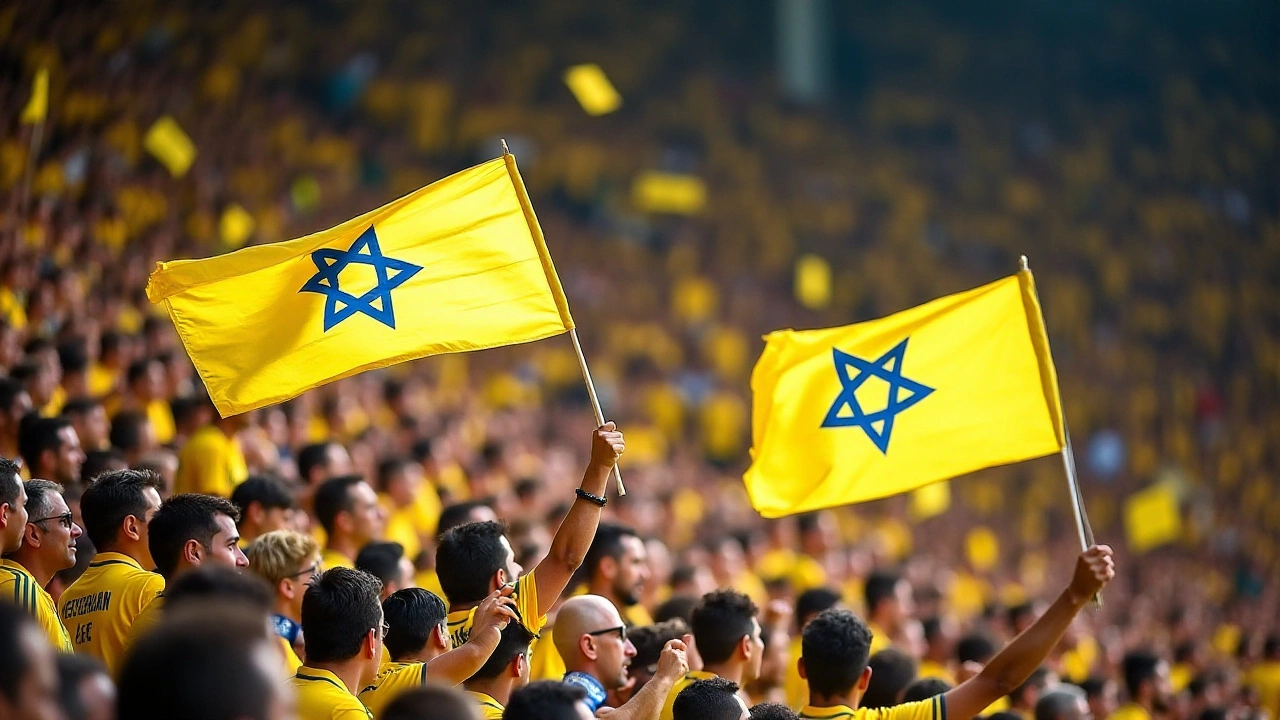
Match Marred by Disturbances
The much-anticipated football match, intended as a celebration of skill and sportsmanship, unfolded in the shadow of these events. Clashes between fans, some fueled by nationalist fervor, and local police forces erupted both outside and within the stadium. Riot police were on high alert, juggling the safety of supporters and maintaining public order amid the chaos. The atmosphere, typically electric with excitement, was tainted by hostility and violence, drawing questions about what could have been done to prevent such incidents.
Police Response and Public Reaction
The Amsterdam police, a force seasoned in handling large public events, found themselves in the eye of the storm. Their approach, which included deploying riot police and making several arrests, was necessary to regain control, albeit criticized for potentially lacking foresight in prevention strategies. The authorities have refrained from releasing specific numbers of those detained, adding a layer of mystery to the unfolding events. Public response has been vocal, with many questioning the effectiveness of existing measures and calling for more aggressive prevention techniques to avert future occurrences.
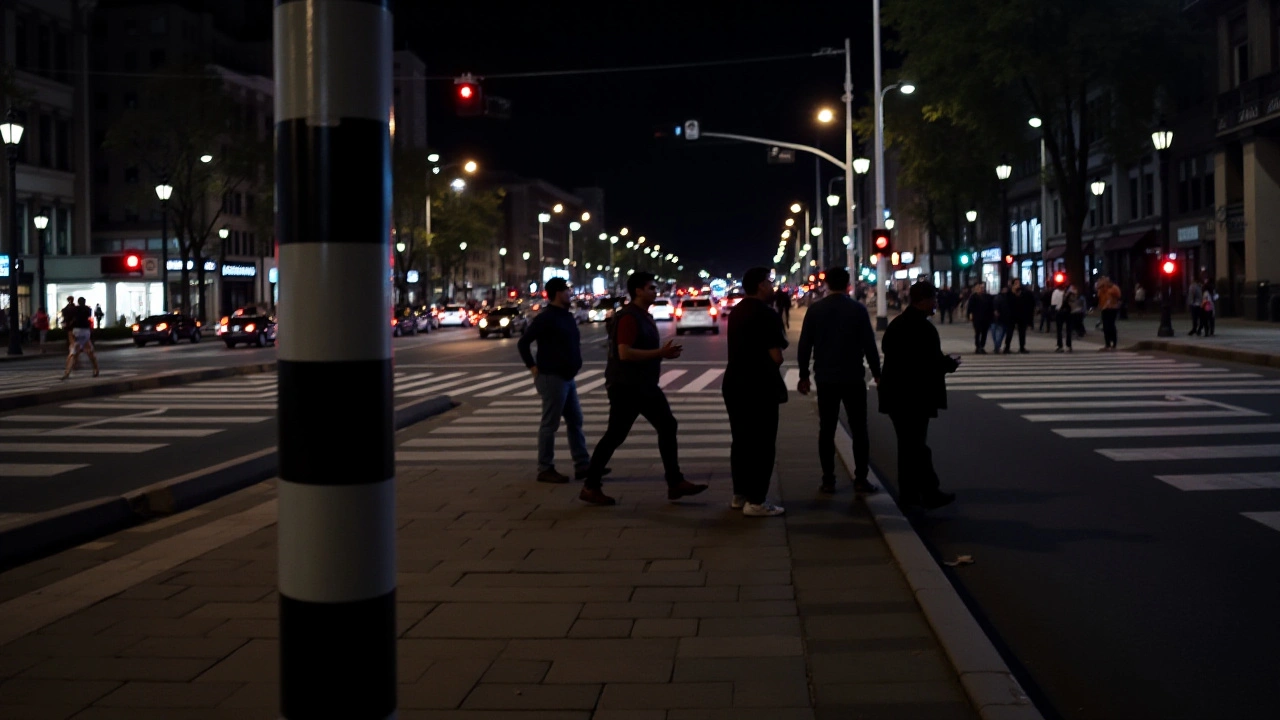
UEFA's Role and Responsibility
The Union of European Football Associations (UEFA), the governing body of football in Europe, faces mounting pressure to address these recurring issues. With the sport inherently meant to foster camaraderie and unite people beyond borders, the incidents in Amsterdam have highlighted discrepancies in that ideal. Critics argue that without concrete action from organizations like UEFA, football risks becoming a battleground for national and political conflicts, rather than a platform for peace and understanding.
Underlying Tensions
While football remains a beloved global pastime, deeply entrenched political rifts, such as those between Israelis and Palestinians, frequently bleed into the grandeur of international matches. These events in Amsterdam are emblematic of this larger issue, reminding us of the continuous struggle for a peaceful coexistence in the context of highly charged sporting environments. Until the root causes of these conflicts are addressed, similar scenes may play out in other cities hosting matches that feature teams tied to longstanding disputes.
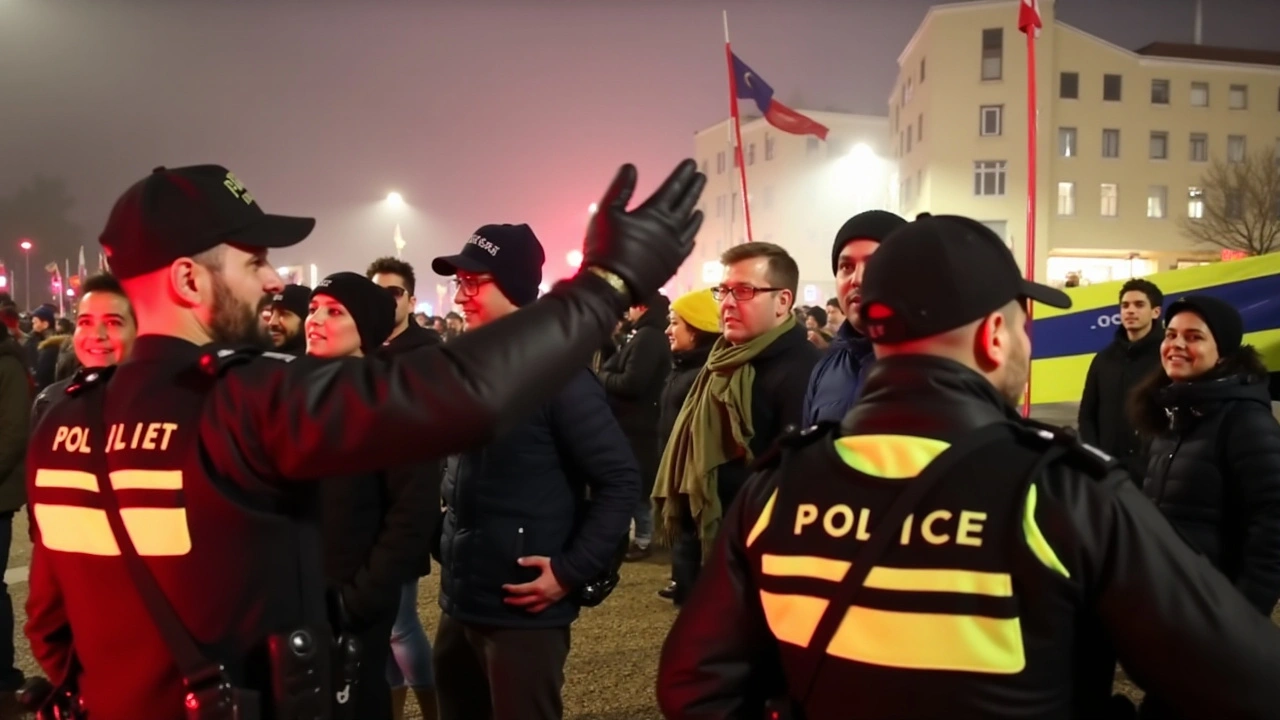
A Call for Unity
The path forward undoubtedly requires a collaborative effort. Governments, football associations, and communities must converge on effective strategies to deescalate potential violence. Promoting dialogue and understanding among fans, conveying a message of unity rather than animosity, could serve to pacify hostile encounters. In this digital age, where messages can quickly reverberate on social media, impactful peace-promoting campaigns are more accessible than ever. However, this effort requires sincerity and dedication from all involved parties.
Looking Ahead
The incidents in Amsterdam are a stern wake-up call for the football community and its governing bodies. They lay bare the need for reassessment and revitalization of the protocols governing spectator behavior and the responsibilities of hosting cities. As football fans worldwide look forward to future matches, one hopes that these events serve as a catalyst for positive change, steering the sport back to its merits of unity, excitement, and celebration.
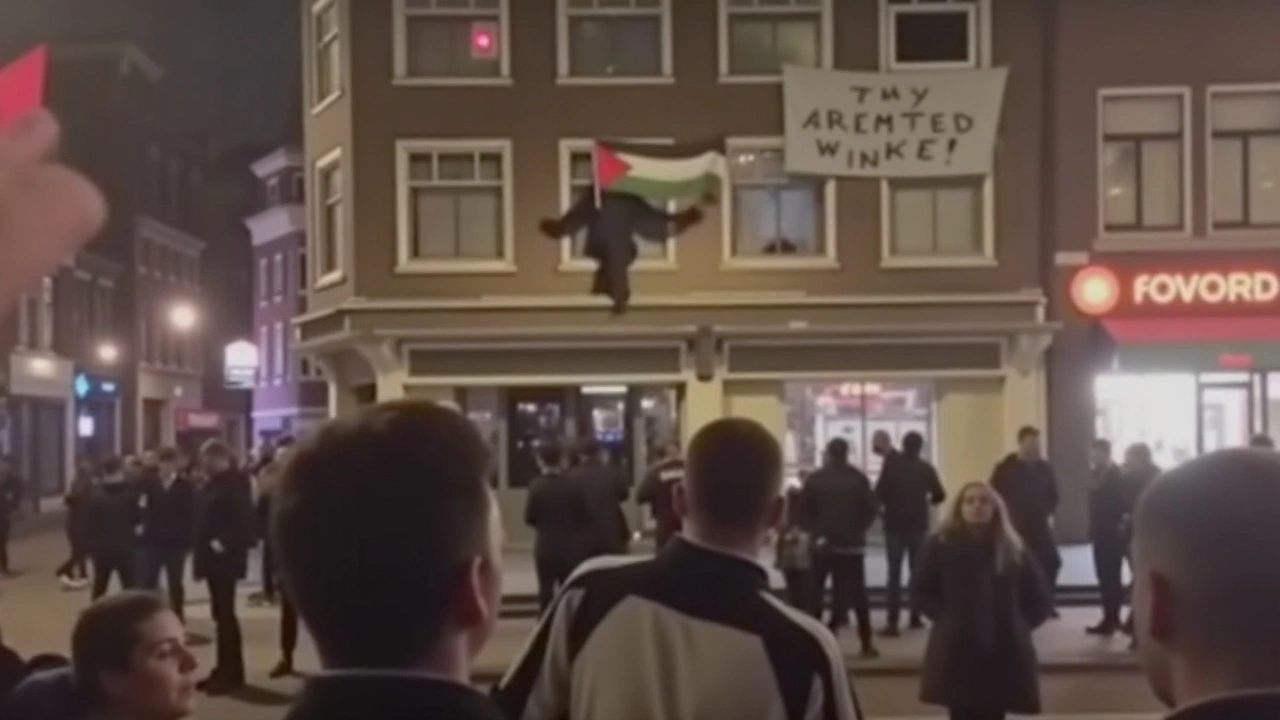
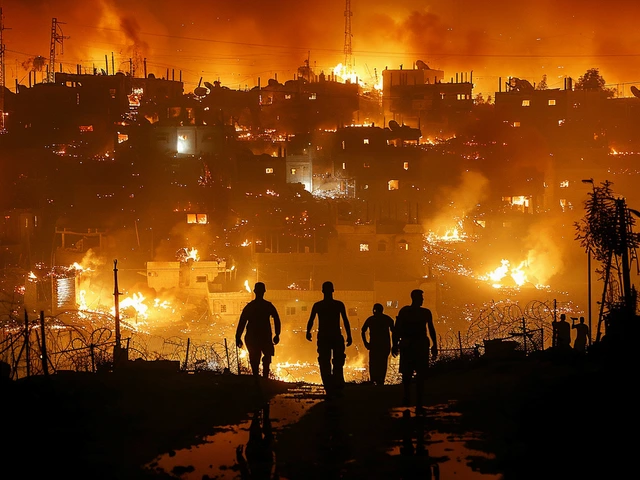




12 Comments
Elizabeth Price
November 10, 2024 AT 04:36 AMThis is such a predictable narrative. Palestinian flags? In Amsterdam? Wow. And you're shocked? Where were these same people when Israeli fans got harassed in Berlin? Or when German fans waved Nazi flags at a match in 2018? You're not condemning violence-you're condemning the wrong side. Double standards are the real problem here. Seriously, who even writes this stuff anymore?
Steve Cox
November 10, 2024 AT 21:17 PMLook. I don't care about football. I don't care about flags. I care about people who think they can bring their political war to a public space and expect not to get called out. These hooligans weren't fans-they were terrorists with jerseys. And the police? They showed up late because they thought it was "just another match." That's not negligence. That's complicity. And before you say "both sides," no. One side was waving flags. The other was tearing them down and chanting death. There's a difference. And if you can't see it, you're part of the problem.
Aaron Leclaire
November 11, 2024 AT 10:36 AMFlags don't cause violence. People do.
Mitch Roberts
November 12, 2024 AT 07:47 AMBro this is wild. I mean like... I went to a Spurs game last year and some dude yelled at me for wearing a Liverpool shirt and I just laughed and bought him a beer. That's how you handle it. Not tearing down flags. Not chanting death. Come on. Football is supposed to be fun. We're all just trying to enjoy the game. Why do we have to turn it into a war zone? Someone needs to teach these people that you don't bring your politics to the stadium unless you want to get kicked out. And honestly? I'm tired of it. Let's just watch the match. 😔
Mark Venema
November 13, 2024 AT 07:59 AMThe events in Amsterdam underscore a systemic failure in the governance of international football. UEFA, as the regulatory authority, has consistently prioritized commercial interests over spectator safety and ethical conduct. The absence of pre-match de-escalation protocols, coupled with inadequate intelligence-sharing between member associations, has created an environment where political extremism can manifest under the guise of fandom. A comprehensive, cross-border behavioral code must be implemented immediately, with mandatory education for all ticket holders and real-time monitoring systems in stadiums. The integrity of the sport depends on it.
Brian Walko
November 14, 2024 AT 20:08 PMI really appreciate the thoughtful analysis here. It's easy to get caught up in the emotion of the moment, but the real issue is how we build systems that prevent this from happening again. Maybe we need fan ambassador programs-trained volunteers from both sides who can diffuse tension before it escalates. Or maybe UEFA should require clubs to co-host peace-building events before high-tension matches. Small steps, but meaningful. We can do better than this.
Derrek Wortham
November 15, 2024 AT 21:00 PMI SAW THIS LIVE. I WAS RIGHT THERE. THE POLICE DIDN'T EVEN TRY TO STOP THEM UNTIL THEY WERE ALREADY AT THE STADIUM. ONE GUY WAS CRYING BECAUSE HIS KID'S DRAWING OF A PALESTINIAN FLAG GOT TORN UP. I TOOK A VIDEO. IT'S ON MY INSTA. #AMSTERDAMHATE #UEFAASLEEPATTHEWHEEL. WHY IS NO ONE TALKING ABOUT THIS? THIS ISN'T JUST FOOTBALL. THIS IS HATE. AND THEY'RE LETTING IT HAPPEN.
Derek Pholms
November 16, 2024 AT 19:00 PMFunny how we treat football like it's some sacred space where politics doesn't belong. But when a Palestinian flag flies, suddenly it's a provocation. When an Israeli flag flies, it's patriotism. The truth? Football is just a mirror. It reflects the world outside. We don't need to keep politics out of the stadium-we need to fix the world that brings it in. The flags aren't the problem. The silence around the conflict is. And no, I'm not taking sides. I'm taking responsibility.
musa dogan
November 17, 2024 AT 06:38 AMAh yes, the grand theater of Western moral outrage-where a flag is torn and suddenly the entire global order is in peril, yet the genocide in Gaza? The systematic erasure of Palestinian homes? The children buried under rubble? Silence. Deafening silence. You weep for a torn flag but not for a torn life? How poetic. How utterly, grotesquely, bourgeois. This isn't about football. It's about performative virtue signaling while the real blood is spilled on the other side of the screen. The hooligans? They're just the tip of the iceberg. The real monsters are the ones who fund the bombs and then tweet "peace" with a 🕊️ emoji.
Mark Dodak
November 17, 2024 AT 16:24 PMI've been to a few of these high-stakes matches in Europe, and honestly, it's always the same. The locals are terrified, the police are overwhelmed, and the fans? They're just trying to enjoy the game, but the noise from the extremists drowns everything out. I think we need a new model-like neutral zones for fan gatherings before matches, where supporters from both sides can mingle under supervision. Maybe even a shared chant, something simple like "We're here for the game," repeated by everyone. It sounds cheesy, but sometimes the simplest ideas are the ones that work. I've seen it in small towns in Germany-fans from rival teams buy each other drinks. It's not magic. It's just human.
Stephanie Reed
November 19, 2024 AT 04:01 AMI just want to say-I'm a mom of two boys who love football. We've been to matches in Chicago, in London, even in Barcelona. I've never seen anything like this. But I also believe people can change. Maybe instead of just punishing the hooligans, we should be reaching out to the quiet fans-the ones who don't chant but don't speak up either. What if we created a mentorship program where older, calm fans guide younger ones? I think if we show them a different way, they'll follow. It's not about blame. It's about building something better.
Jason Lo
November 21, 2024 AT 02:49 AMThis is exactly why I stopped watching football. Every single time, it's the same. Some group of idiots thinks their national identity gives them the right to act like animals. And the media? They turn it into a spectacle. You want peace? Then stop giving these clowns a platform. Don't report their chants. Don't show their faces. Don't give them the oxygen they crave. Let them fade into obscurity. And while you're at it, stop pretending football is innocent. It's a billion-dollar industry built on tribalism. Wake up.